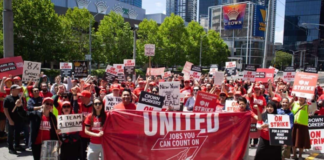Fiji returned to the polls last month in its first democratic election since the 2006 coup. The result was a decisive victory for popular former Rear Admiral, Voreqe Bainimarama, and his party Fiji First, who won a resounding 60 per cent of the vote, translating into 32 of the 50 parliamentary seats. Bainimarama has ruled the country for the last eight years as an interim government established by the coup.
Whilst some of the opposition parties raised concerns about voting irregularities, almost all parties have now accepted Bainimarama’s mandate to govern Fiji for the next four years. Bainimarama’s determination to implement a new non-racial constitution, challenging the exclusive powers of the old elites, in particular the Indigenous Council of Chiefs, cut through most strongly with voters.
The new government has also introduced free primary and secondary education as one measure to bridge the historical racial divide between ethnic and Indo-Fijians.
Bainimarama’s opposition to communalism however could be undermined by his plans to modernise Fijian capitalism, which inevitably means squeezing Indian and Fijian workers, while poverty increases.
The old elites remain organised and willing to re-ignite race-based politics. Without building a united, independent working-class mobilisation, the current relief from race-based politics could be just temporary.
Election result
Bainimarama’s determination to oppose Fiji’s legacy of ethnic and religious divisions saw the vast majority of Indo-Fijian support switch from Fiji’s Labour Party to Fiji First and split the ethnic Fijian vote. Fiji has experienced four coups over the last 20 years. Until Bainimarama seized power in 2006, previous coups had been driven by the old indigenous elite using anti-Indian racism to defend their political privileges.
The communalist divisions which have routinely ruptured Fijian society are a product of Britain’s colonial “power-sharing” arrangement after independence in 1970, in which gerrymandered institutionalised divisions maintained the power of the Indigenous Council of Chiefs.
The first coup in 1987, when Lieutenant Colonel Rabuka removed the democratically elected Labour Party, set the scene for a series of coups driven by the old elite.
The result has been an exodus of both more skilled Indian workers and Indians with money. This has proven to be a major stumbling block for the development of Fijian capitalism. The Indian population in Fiji has declined, going from around 50 per cent to the current level of 36 per cent.
SODELPA (Social Democratic Liberal Party associated with previous PM Lasane Qairase who removed Fiji’s first Indian, and Labour Party, Prime Minister Mahendra Chaudry in 2000) is the party of the old elite. It appealed mainly to the Indigenous Fijian community on the communalist basis of threats to the elite’s privileges such as the dissolution to the Great Council of Chiefs, and to their control of land by which the chiefs had extracted rents from mostly Indian small-holding farmers.
During the election, SOLDELPA also tried to stoke communalist fires by proclaiming they wanted to establish Fiji as a “Christian State”.
Bainimarama however appealed to secularism, to avoid alienating Hindu and Muslim voters in the Indian community, which proved popular amongst voters. SODELPO received only 29 per cent of the vote.
The decline of Fiji’s Labour Party (FLP) was dramatic. It received only 2.9 per cent. Its inconsistency has cost it dearly. After the 2006 coup, the Labour Party joined Bainimarama’s government. But as disaffection with Bainimarama grew, they opportunistically collaborated with the old elite rather than organise independent working class resistance. By 2014, the FLP even declared it would form a coalition government with SODELPO.
Challenges in the future—class solidarity needed
Although Bainimarama remains popular, the ongoing issues of poverty, workers’ rights and conditions could potentially undo the steps to make communalism part of Fiji’s past. Bainimarama won Indigenous Fijian support through addressing the endemic poverty of Indigenous Fijians, for example, providing free education and free bus fares. But in general, living standards have stalled and the textile, clothing and footwear sector has contracted.
Bainimarama has recast Fijian national politics, but he is no friend of Fijian workers. His commitment to Fijian capitalism has seen him unleash vicious attacks on trade unions and Indian and Fijian workers. Union officials have been arrested and they were prohibited from standing in the latest elections.
In 2008 and 2009, Bainimarama’s interim government privatised Fiji’s airports and ports, and over-ruled 20 per cent wage increases for the lowest paid Fijian workers. Pensions were also cut. In 2013, Fijian sugar workers had gone without pay increases for seven years.
It will take independent class mobilisation, uniting Fijian and Indian workers, to finally eliminate ethnic nationalism and establish genuine democracy.
By Jasmine Ali





